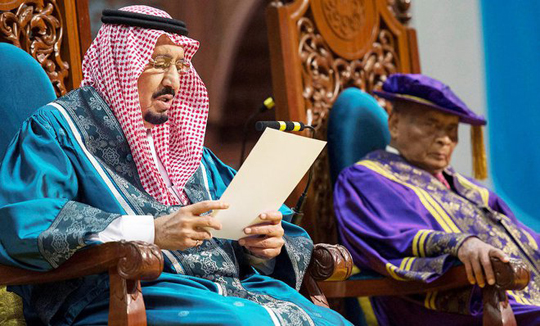Riyadh, Mar 1: King Salman has called on Muslim nations to unify their ranks to solve problems facing Islamic countries in the current volatile situation in regional and international developments.

The king spoke in Kuala Lumpur on Tuesday when he met a group of senior Malaysian scholars including muftis and Islamic workers.
A day before King Salman wraps up his visit to Malaysia and travels to Indonesia, the king was conferred an honorary doctorate by the premier International Islamic University Malaysia (IIUM) on Tuesday.
The honorary degree and a “Lifetime Outstanding Achievement Award” were presented to him at a special convocation ceremony at the IIUM Cultural Center by Pahang state ruler Sultan Ahmad Shah, head of the university.
“The Muslim world is confronted by many challenges that require patience, compassion and determination. King Salman is not an ordinary person; his duties and obligations to his country and followers of Islam demand composure and great patience by him,” Sultan Ahmad said. “King Salman represents the qualities that our religion urges us to acquire.”
On meeting senior Islamic scholars in Malaysia, King Salman said the major challenge facing the Muslim nation is how to protect countries from extremism. “The king talked about campaigns against Islam, which are trying to undermine its moderation and tolerance,” said a Saudi Press Agency (SPA) report on Tuesday.
The king noted the challenges facing the Muslim world require more cooperation and solidarity among Islamic countries. He emphasized the Kingdom’s willingness to “provide everything it can do to serve Islam and communicate with Muslims all over the world.”
In another meeting, King Salman received at his residence in Kuala Lumpur Malaysian Minister of Defense Hishammuddin Hussein. They reviewed bilateral relations, prospects of cooperation between the two countries and the latest developments in the region including cooperation in the defense sector.
On the sidelines of the visit, the Saudi Ministry of Commerce and Investment organized the Saudi-Malaysian Business Forum in the presence of a large group of Saudi and Malaysian businessmen in the Malaysian capital on Tuesday. The meeting was addressed by Ghassan Ahmed Al-Sulaiman, governor of the General Authority for Small and Medium Enterprises.
Al-Sulaiman said that the Kingdom wants to attract investments in accordance with the goals of Vision 2030. The forum was also addressed by Malaysian Minister of International Trade and Industry Mustapa bin Mohamed. He said: “The visit of King Salman to Malaysia gives Saudi-Malaysian relations a strong push forward and enhances economic and trade cooperation.”
He also said the two countries have available business opportunities for investment and cooperation. He also noted the volume of trade exchange between the two countries is witnessing quantitative and qualitative growth. Malaysia, he said, hopes to forge closer ties with Saudi Arabia in trade, investment, tourism, and the halal sector and in developing small and medium enterprises.
King Salman also received at his residence in the Malaysian capital Kuala Lumpur a group of Saudi students on scholarships in Malaysia and Malaysian students who graduated from Saudi universities. The king told them: “I’m glad to see you … at the same time you must know that you are from the land of Muslims’ Qiblah, and you should be good models for those who see you in this country.”
On the sidelines of the royal visit, Ali bin Nasser Al-Ghafis, Saudi minister of labor and social development, met in Kuala Lumpur Rohani Abdul Karim, Malaysian minister of women, family and community development.
They discussed ways of strengthening “social development and the exchange of expertise, as well as topics related to the promotion of women’s role in community development.”




Comments
Add new comment